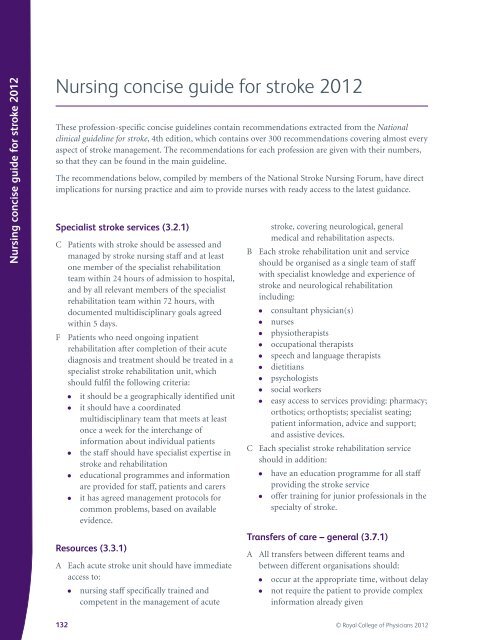national-clinical-guidelines-for-stroke-fourth-edition
national-clinical-guidelines-for-stroke-fourth-edition
national-clinical-guidelines-for-stroke-fourth-edition
Create successful ePaper yourself
Turn your PDF publications into a flip-book with our unique Google optimized e-Paper software.
Nursing concise guide <strong>for</strong> <strong>stroke</strong> 2012<br />
Nursing concise guide <strong>for</strong> <strong>stroke</strong> 2012<br />
These profession-specific concise <strong>guidelines</strong> contain recommendations extracted from the National<br />
<strong>clinical</strong> guideline <strong>for</strong> <strong>stroke</strong>, 4th <strong>edition</strong>, which contains over 300 recommendations covering almost every<br />
aspect of <strong>stroke</strong> management. The recommendations <strong>for</strong> each profession are given with their numbers,<br />
so that they can be found in the main guideline.<br />
The recommendations below, compiled by members of the National Stroke Nursing Forum, have direct<br />
implications <strong>for</strong> nursing practice and aim to provide nurses with ready access to the latest guidance.<br />
Specialist <strong>stroke</strong> services (3.2.1)<br />
C Patients with <strong>stroke</strong> should be assessed and<br />
managed by <strong>stroke</strong> nursing staff and at least<br />
one member of the specialist rehabilitation<br />
team within 24 hours of admission to hospital,<br />
and by all relevant members of the specialist<br />
rehabilitation team within 72 hours, with<br />
documented multidisciplinary goals agreed<br />
within 5 days.<br />
F Patients who need ongoing inpatient<br />
rehabilitation after completion of their acute<br />
diagnosis and treatment should be treated in a<br />
specialist <strong>stroke</strong> rehabilitation unit, which<br />
should fulfil the following criteria:<br />
● it should be a geographically identified unit<br />
● it should have a coordinated<br />
multidisciplinary team that meets at least<br />
once a week <strong>for</strong> the interchange of<br />
in<strong>for</strong>mation about individual patients<br />
● the staff should have specialist expertise in<br />
<strong>stroke</strong> and rehabilitation<br />
● educational programmes and in<strong>for</strong>mation<br />
are provided <strong>for</strong> staff, patients and carers<br />
● it has agreed management protocols <strong>for</strong><br />
common problems, based on available<br />
evidence.<br />
Resources (3.3.1)<br />
A Each acute <strong>stroke</strong> unit should have immediate<br />
access to:<br />
● nursing staff specifically trained and<br />
competent in the management of acute<br />
<strong>stroke</strong>, covering neurological, general<br />
medical and rehabilitation aspects.<br />
B Each <strong>stroke</strong> rehabilitation unit and service<br />
should be organised as a single team of staff<br />
with specialist knowledge and experience of<br />
<strong>stroke</strong> and neurological rehabilitation<br />
including:<br />
● consultant physician(s)<br />
● nurses<br />
● physiotherapists<br />
● occupational therapists<br />
● speech and language therapists<br />
● dietitians<br />
● psychologists<br />
● social workers<br />
● easy access to services providing: pharmacy;<br />
orthotics; orthoptists; specialist seating;<br />
patient in<strong>for</strong>mation, advice and support;<br />
and assistive devices.<br />
C Each specialist <strong>stroke</strong> rehabilitation service<br />
should in addition:<br />
● have an education programme <strong>for</strong> all staff<br />
providing the <strong>stroke</strong> service<br />
● offer training <strong>for</strong> junior professionals in the<br />
specialty of <strong>stroke</strong>.<br />
Transfers of care – general (3.7.1)<br />
A All transfers between different teams and<br />
between different organisations should:<br />
● occur at the appropriate time, without delay<br />
● not require the patient to provide complex<br />
in<strong>for</strong>mation already given<br />
132 © Royal College of Physicians 2012


